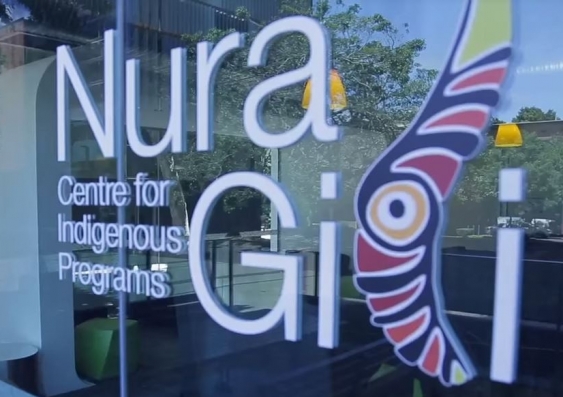“If you want to do any type of research that involves the Indigenous community, where better to go than an Indigenous Studies PhD? And Nura Gili, in particular, who have people who can guide you and mentor you and give you all the support you need.”
That’s the assessment of student Madeline News about one of UNSW’s newest doctoral programs that focuses on decolonising research methodologies, as well as prioritising and centring Indigenous perspectives.
The Indigenous Studies PhD run by the Nura Gili Indigenous Programs Centre was launched in 2018 to expand the opportunity for students to pursue higher degree research and take the first step towards a possible career in academia.
Dr Diana Perche, Academic and Postgraduate Coordinator at Nura Gili, says the PhD has been an important addition to the suite of degrees on offer.
“Nura Gili has been expanding what it does in the area of Indigenous Studies for some years now,” she explains.
“We established a major in the undergraduate program some years ago and then we established an honours program and the next step was to open up a PhD in Indigenous Studies. We bring in a lot of Indigenous students and we have great results in terms of retention and completion, but up to now there has been a question about what do they do after that.
“There was certainly demand already there. I had been receiving quite a few enquiries about the possibility of doing a PhD in Indigenous Studies, but up until this year we’ve had no way of doing it.
“Those people would maybe get referred to a different faculty, but we now have the capacity to offer it ourselves, which is very valuable.”
Valuable pathway
It’s anticipated that the program will provide a valuable pathway for Aboriginal and Torres Strait Islander students.
“We hope and expect that we will attract Indigenous students and support good numbers of them in this PhD program,” Dr Perche says.
“I have a lot of enquiries from Indigenous students and we hope to turn those into applications, but the requirements are as high for any other PhD.
“Indigenous Studies is important because the Indigenous perspective is so often overlooked or suppressed in the way we consider the complex social problems we face today. It’s about bringing those voices to the forefront and documenting and recording, and drawing out those voices as much as possible.
“This PhD program is designed very much to provide the research training for Indigenous students to conduct research themselves, and be able to lead research projects in the future.
“They can then also take that knowledge back to their own communities and help build strength and capacity. Some may also choose to become academics and experts who can shape key policy debates in the future.”
For non-Indigenous students, the Nura Gili centre’s staff offer vital support and assistance about cultural issues, as well as a wealth of knowledge and experience when it comes to building relationships with key figures in the Aboriginal and Torres Straits Islander communities.

Indigenous Studies PhD candidate Madeline News is researching Aboriginal self-determination with regards to health policy and healthcare practice
Madeline News has already benefited from that support in the first few months of her PhD, which focuses on Aboriginal self-determination with regards to health policy and healthcare practice. The field of research is crucial given there is a big gap in terms of non-Indigenous Australians currently living around 10 years longer on average than Aboriginal Australians.
She explains: “For people like me who are non-Indigenous and who want to go into Indigenous research, the Nura Gili program is vital because you do need the additional mentorship.
“When I looked at other general programs in the health discipline, the knowledge about Indigenous health issues was very limited, and the places to look for help was limited as well.
“Because I’m now doing my PhD studies in an Indigenous programs unit such as Nura Gili, it means a lot of those barriers are gone. I have more access, as well as the mentorship that’s important as a non-Indigenous researcher in this area.”
Scientia PhD Scholarship Scheme
The Indigenous Studies PhD is also linked to the UNSW Scientia PhD Scholarship Scheme which is a key part of the university’s dedication to harnessing cutting-edge research which helps solve complex problems and improves the lives of people in local and global communities.
The scheme covers four years of tuition fees and offers a $40,000-per-year stipend, plus an additional $10,000 to assist with career development and international research collaborations – with at least five of the scholarships reserved for Indigenous candidates.
News was successful in her Scientia Scholarship application last year and says the award has been vital to helping her take the next step in her studies.
“It definitely would have been a lot harder for me to do the PhD without the Scientia Scholarship, especially in terms of the additional career development,” she says.
“Things obviously cost money and being a PhD student means you are on a limited budget, so that opens up more opportunities to simultaneously reach more of my goals and develop further.
“It means that by the time I finish my PhD, I will be more prepared as a professional.”
Anybody interested in the Indigenous Studies PhD should contact Diana Perche – via the Nura Gili website – who can assist people with their application, help formulate their proposal and guide them towards the best supervisors.
Applications for the first scholarship round for the 2019 PhD by Research in Indigenous Studies program close on 12 October 2018.



